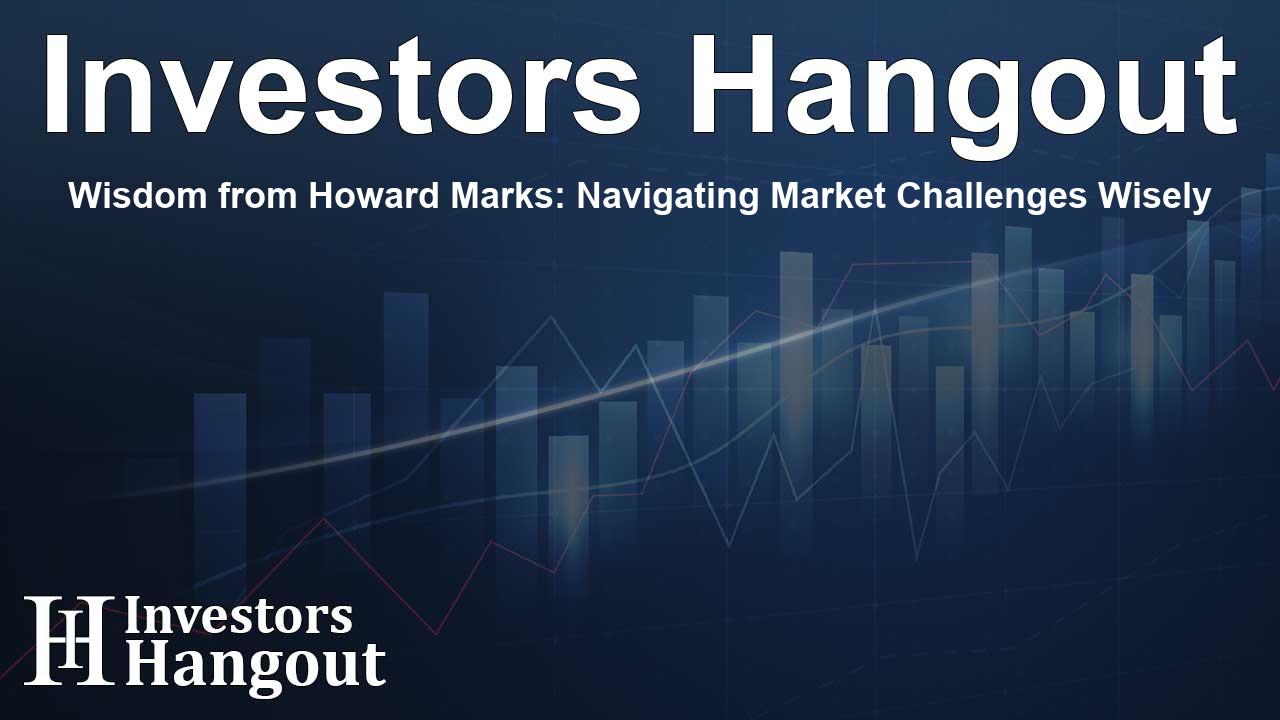Wisdom from Howard Marks: Navigating Market Challenges Wisely

A Deep Dive into Howard Marks' Investing Philosophy
Howard Marks, co-founder and co-chairman of Oaktree Capital, has garnered respect in the financial community for his insightful investment strategies over decades. His acumen in market observation has transformed into a wealth of wisdom, as he continues to celebrate his 35 years of drafting investment memos that influence investors globally.
The Impact of History on Investment Decisions
Reflecting on his successful past, Marks often cites the influence of Edward Chancellor's book, "Devil Take the Hindmost.” The historical narrative of financial speculation revealed similarities to the late 1990s dot-com bubble. The observations he made about the market dynamics during that era positioned him as an early voice of caution.
Recognizing Market Cycles
Marks emphasizes the importance of understanding where we are in the market cycle rather than trying to time the market. He firmly believes in acknowledging the cycle's nuances, stating, "We never know where we're going, but we sure should know where we are." This principle aids investors in making informed decisions based on current market conditions without the futile hope of perfect timing.
Understanding Competitive Advantage
In his famous writings, Marks echoes sentiments made by renowned investor Warren Buffett. Rather than merely predicting how an industry will shape society, he encourages investors to assess companies based on their competitive advantages. This perspective remains relevant as emerging technologies like AI promise efficiency gains but do not guarantee profitability.
Assets and Their Value
Marks differentiates between assets that yield cash flow and those that do not. This understanding clarifies the intricacy behind valuing an asset based on its market behavior, especially in turbulent times. It warrants a thorough evaluation of whether an investment is sound in both the short and long term.
The Role of Sentiment in Investments
With current market dynamics, Marks notes that sentiment greatly influences market performance, particularly regarding assets like gold. While gold may seem like a safe haven in uncertain times, his analysis reveals that successful investing correlates with a rational assessment of risk and reward rather than sheer emotional responses.
Developing Resilient Investment Strategies
He advocates for a disciplined approach to investing through "second-level thinking," a method requiring deeper analysis that goes beyond surface-level insights. Marks acknowledges that the market's nature is driven by its participants' emotions and behaviors, hence the necessity of a rational strategy rather than emotional reactions.
Successful Investment Practices and Strategies
Despite his extensive experience in the market, Marks presents a straightforward philosophy: invest regularly, early, and understand the importance of holding investments long-term. Abandoning the temptation to react to market volatility is crucial. He warns that market timing poses considerable challenges even for seasoned investors.
Understanding Market Risks
Marks clearly identifies the importance of being judicious with investments. The concept of taking calculated risks, knowing one’s limitations, and being prepared for market fluctuations fosters a sense of discipline in investment practices. Understanding that investors are often driven by emotions paves the way for making even-handed decisions.
The Power of Discipline and Reflection
The longevity of Marks' success in the investment arena stems from a strong foundation in discipline. His experience highlights that the key to thriving in the financial world is recognition of one’s ability to stay grounded in well-thought-out strategies over mere reactions to trends. The lessons he shares from his investment memos encourage reflection, analysis, and ultimately, patience.
Frequently Asked Questions
What is Howard Marks known for?
Howard Marks is known for his investment insights and strategies as the co-founder of Oaktree Capital, and he is recognized for his impactful investment memos.
Why does Marks emphasize understanding market cycles?
Understanding market cycles helps investors make informed decisions rather than attempting to perfectly time the market, leading to better investment outcomes.
How does competitive advantage relate to investment success?
Competitive advantage signifies a company's ability to sustain profitability and outperform its rivals, which is crucial for long-term investment success.
What caution does Marks express regarding emerging technologies?
Marks cautions that while technologies like AI can enhance efficiency, they do not always guarantee profitability, urging investors to assess their implications critically.
What investment strategy does Marks recommend for success?
Marks recommends investing early, consistently, and with discipline while avoiding the pitfalls of attempting to time the market effectively.
About The Author
Contact Lucas Young privately here. Or send an email with ATTN: Lucas Young as the subject to contact@investorshangout.com.
About Investors Hangout
Investors Hangout is a leading online stock forum for financial discussion and learning, offering a wide range of free tools and resources. It draws in traders of all levels, who exchange market knowledge, investigate trading tactics, and keep an eye on industry developments in real time. Featuring financial articles, stock message boards, quotes, charts, company profiles, and live news updates. Through cooperative learning and a wealth of informational resources, it helps users from novices creating their first portfolios to experts honing their techniques. Join Investors Hangout today: https://investorshangout.com/
The content of this article is based on factual, publicly available information and does not represent legal, financial, or investment advice. Investors Hangout does not offer financial advice, and the author is not a licensed financial advisor. Consult a qualified advisor before making any financial or investment decisions based on this article. This article should not be considered advice to purchase, sell, or hold any securities or other investments. If any of the material provided here is inaccurate, please contact us for corrections.
